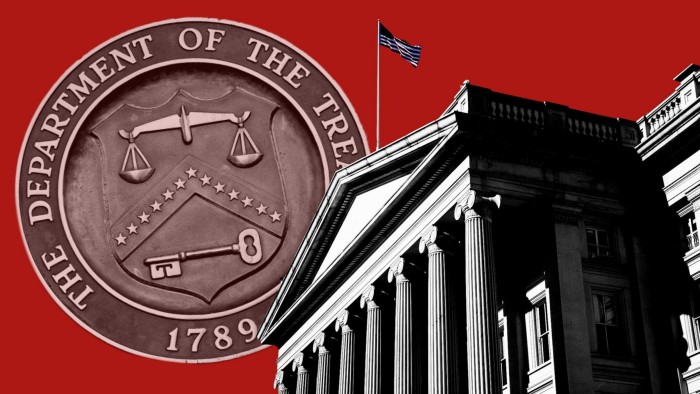Unlock the White House Watch newsletter for free
Your guide to what the 2024 US election means for Washington and the world
The dollar slumped on Monday as investors responded to mounting uncertainty over US economic policy following President Donald Trump’s attacks on Federal Reserve chair Jay Powell.
The dollar fell to a three-year low against a basket of its key trading partners. Gold rose to a fresh record of $3,385 per troy ounce while the Swiss franc climbed 1 per cent against the dollar to SFr0.8069, a ten-year high. The euro and yen both rallied over 1 per cent against the dollar.
US sovereign debt sold off. Yields on 10-year US Treasuries rose 0.035 percentage points to 4.36 per cent, while 30-year Treasury yields rose 0.065 percentage points to 4.86 per cent. Bond yields move inversely to prices.
“What we’re seeing is a breakdown between FX and rates,” said Parisha Saimbi, a foreign exchange strategist for Asia at BNP Paribas, noting that usually the dollar and US Treasuries do not sell off simultaneously. “Yields have been moving higher in the US and that’s also leading to a weaker dollar, which is not your typical relationship.”
“With the risk of recession rising in the US now and with tariff concerns ongoing, global investors may be reconsidering their portfolio holdings,” Saimbi said, noting that the euro and yen may be benefiting from investors repatriating assets.
“We have observed renewed USD outflow momentum within iFlow,” said Wee Khoon Chong, a strategist at BNY, referring to proprietary bank data.
The moves came after Kevin Hassett, director of the National Economic Council, said Donald Trump would “continue to study” the question of dismissing Federal Reserve chair Jay Powell. Trump had claimed on Thursday that he had the right to fire Powell.
“If you think that it’s unacceptable for President Trump to be frustrated with the policy history of the Fed, then I think you . . . got some explaining to do,” Hassett told reporters in Washington on Friday, when US markets were closed.
The moves during Asian trading on Monday are the first sign of a market response to his comments. Trading was thin in the region, with markets in Hong Kong and Australia closed for the Easter holiday.
Stock market benchmarks in Japan and Taiwan fell 1.4 per cent and 1.2 per cent respectively, while China’s CSI 300 edged up 0.2 per cent.
Futures for the S&P 500 and Nasdaq were both down 0.8 per cent.
Trump has repeatedly put pressure on Powell to cut interest rates. The Fed has so far kept rates on hold this year after lowering them three times in 2024.
The Federal Reserve sets monetary policy independently of the other branches of government. Any attempt to oust Powell, whose term is scheduled to end in May 2026, or pressure monetary policy could cause further market turmoil in the US, according to investors and analysts.



